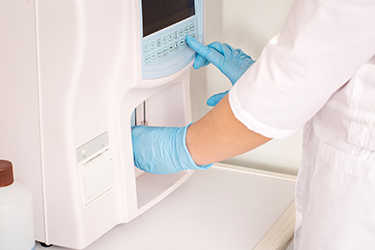In-House Labs as Medical Best Practice

Why companion, equine and large animal veterinarians should offer in-house lab services
Lab testing should be an important part of every routine exam or wellness visit among equine, large and companion animal veterinarians, not only to maintain herd health but to protect agricultural, companion animal and public health interests. Offering these services in-house promotes a medical best practice in an expensive market where producers and pet owners want to save money while still receiving quality care for their companion, herd and food animals.
The value of simple blood work during routine visits
It can be a struggle for veterinarians to effectively market their practice and the services they provide. They may even find it difficult to fully diagnose a disease and provide effective treatment options. Bringing diagnostics in-house strengthens your service offerings while lowering costs and the time spent collecting samples, processing them for shipment to a lab and following up with the client.
In-house veterinary lab services can mean the difference between life and death for herd animals
It can feel like a sales pitch to recommend lab work when a client’s finances are tight or when producers opt to handle vaccinations or labs themselves. However, the opportunity to analyze blood, urine or fecal tests during routine visits not only allows faster diagnosis of affected animals, it can minimize or reduce the chance of outbreak. Large animal veterinarians also can share the news of outbreaks among other producers, veterinarians, farm bureaus or governmental regulatory agencies.
Laboratory medicine is a standard part of the procedure during doctor’s visits, so why not for veterinary visits? Most clients have grown to expect this process for themselves. It’s no different when it comes to their animal’s health, but they will want to know the value of these testing efforts. A quick and easy lab process done on-site, whether in your clinic or on a call, presents a powerful solution for correctly diagnosing conditions and diseases, recommending the next course of action and gaining clients’ trust.
How to market in-house diagnostics
Dr. Kent Adams is the founder of Appalachian Veterinary Services in Christiansburg, Virginia, and served on the Abaxis Scientific Advisory Board. He advises veterinarians to take blood at the start of a physical exam on any animal presented for anything other than preventive health. He states to clients that the purpose of this is such that if he is unable to come to a clear understanding of the problem, he has a starting point to work from and a blood sample has not been affected by the stress of the examination. In Dr. Adams experience, the three most common questions that arise during this process are:
- Do you think we need to run any blood work?
- When will the results be available?
- How much will it cost?
The beauty of running blood for all animal patients, from dogs and cats to horses and cattle, is that it adds to the understanding of an animal’s case and helps veterinarians to come up with the optimal treatment plan. Best of all, for lab work that is done in-house, the results can be available in minutes. If there’s a good understanding of an animal’s condition and needs but they don’t respond to a proposed treatment, the blood that has been taken and set aside is readily available for further testing. These facts help clients to feel at ease and understand the tremendous importance of point-of-care diagnostics.
Covetrus North America has a comprehensive set of integrated services and technology solutions for veterinary practices of all sizes. Contact your sales representative at 855-724-3461 or reach out online to learn more.
This blog post was adapted from an article in the Fall 2015 issue of our Animal Health Magazine entitled Powerful ideas to market in-house lab services by Dr. Kent Adams, DVM.
Sources


Working Here
Our team members are encouraged to be the best they can be... at Covetrus we believe we impact one another.
Learn MoreNews & Events
FDA Cautions Pet Owners Not to Feed Texas Tripe Inc. Raw Pet Food Due to Salmonella, Listeria Monocytogenes
The U.S. Food and Drug Administration is cautioning pet owners not to feed their pets any of the Texas Tripe brand raw frozen pet food listed below because several samples of Texas Tripe raw pet food have tested positive for Salmonella and/or L. mono.
Careers
Are you looking for a place to let your talents shine? At Covetrus, we help our practitioner customers better serve their patients and take pride in providing the best customer experience possible. Search our open positions to see our available opportunities.
Newsletter
Stay current with what’s going on with Covetrus, subscribe to receive our newsletter and email communications. Subscribers will receive the latest information in practice management, sales and marketing, animal health, and more.



-3-(1).png?sfvrsn=2d806d73_0)

Leave a comment